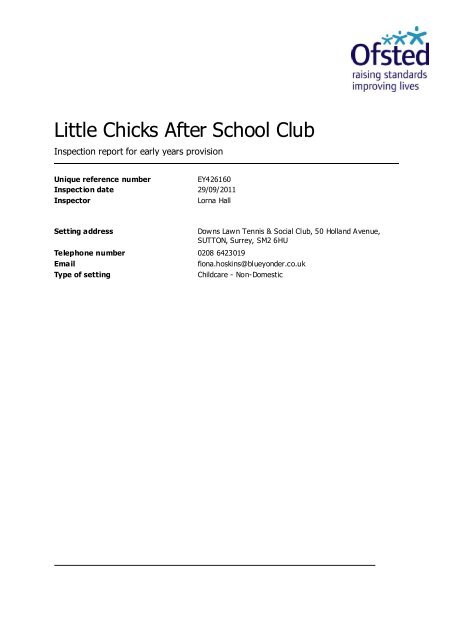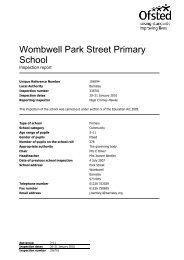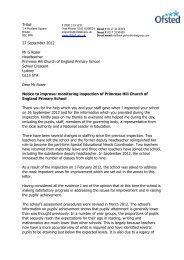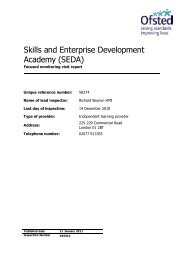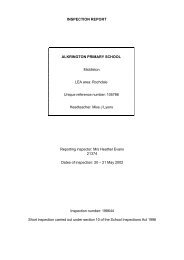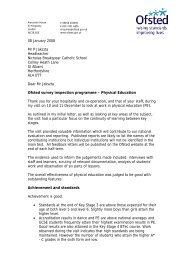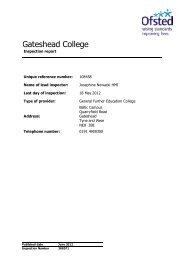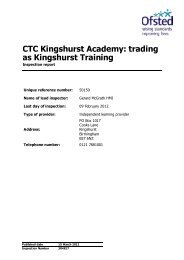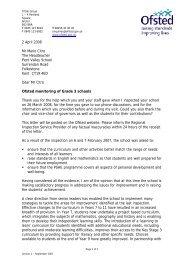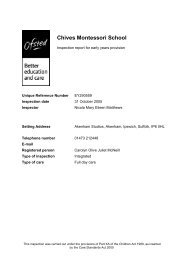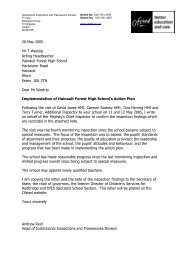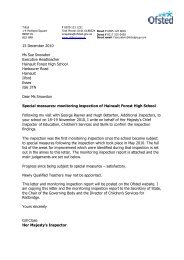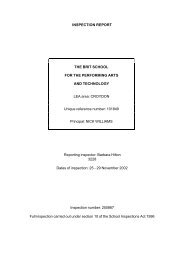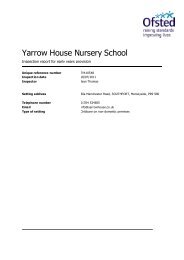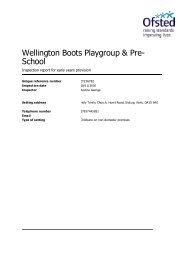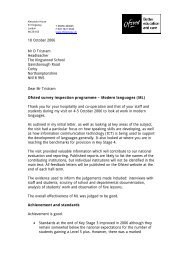Annex B: the Childcare Register - Ofsted
Annex B: the Childcare Register - Ofsted
Annex B: the Childcare Register - Ofsted
Create successful ePaper yourself
Turn your PDF publications into a flip-book with our unique Google optimized e-Paper software.
Little Chicks After School Club<br />
Inspection report for early years provision<br />
Unique reference number EY426160<br />
Inspection date 29/09/2011<br />
Inspector Lorna Hall<br />
Setting address Downs Lawn Tennis & Social Club, 50 Holland Avenue,<br />
SUTTON, Surrey, SM2 6HU<br />
Telephone number 0208 6423019<br />
Email fiona.hoskins@blueyonder.co.uk<br />
Type of setting <strong>Childcare</strong> - Non-Domestic
Inspection Report: Little Chicks After School Club, 29/09/2011<br />
The Office for Standards in Education, Children's Services and Skills (<strong>Ofsted</strong>) regulates and inspects<br />
to achieve excellence in <strong>the</strong> care of children and young people, and in education and skills for<br />
learners of all ages. It regulates and inspects childcare and children's social care, and inspects <strong>the</strong><br />
Children and Family Court Advisory Support Service (Cafcass), schools, colleges, initial teacher<br />
training, work-based learning and skills training, adult and community learning, and education and<br />
training in prisons and o<strong>the</strong>r secure establishments. It assesses council children’s services, and<br />
inspects services for looked after children, safeguarding and child protection.<br />
If you would like a copy of this document in a different format, such as large print or Braille, please<br />
telephone 0300 123 1231, or email enquiries@ofsted.gov.uk.<br />
You may copy all or parts of this document for non-commercial educational purposes, as long as<br />
you give details of <strong>the</strong> source and date of publication and do not alter <strong>the</strong> information in any way.<br />
T: 0300 123 1231<br />
Textphone: 0161 618 8524<br />
E: enquiries@ofsted.gov.uk<br />
W: www.ofsted.gov.uk<br />
© Crown copyright 2011<br />
2
Inspection Report: Little Chicks After School Club, 29/09/2011<br />
Introduction<br />
This inspection was carried out by <strong>Ofsted</strong> under Sections 49 and 50 of <strong>the</strong><br />
<strong>Childcare</strong> Act 2006 on <strong>the</strong> quality and standards of <strong>the</strong> registered early years<br />
provision. ‘Early years provision’ refers to provision regulated by <strong>Ofsted</strong> for children<br />
from birth to 31 August following <strong>the</strong>ir fifth birthday (<strong>the</strong> early years age group).<br />
The registered person must ensure that this provision complies with <strong>the</strong> statutory<br />
framework for children’s learning, development and welfare, known as <strong>the</strong> Early<br />
Years Foundation Stage.<br />
The provider must provide a copy of this report to all parents with children at <strong>the</strong><br />
setting where reasonably practicable. The provider must provide a copy of <strong>the</strong><br />
report to any o<strong>the</strong>r person who asks for one, but may charge a fee for this service<br />
(The <strong>Childcare</strong> (Inspection) Regulations 2008 regulations 9 and 10).<br />
The setting also makes provision for children older than <strong>the</strong> early years age group<br />
which is registered on <strong>the</strong> voluntary and/or compulsory part(s) of <strong>the</strong> <strong>Childcare</strong><br />
<strong>Register</strong>. This report does not include an evaluation of that provision, but a<br />
comment about compliance with <strong>the</strong> requirements of <strong>the</strong> <strong>Childcare</strong> <strong>Register</strong> is<br />
included in <strong>Annex</strong> B.<br />
Please see our website for more information about each childcare provider. We<br />
publish inspection reports, conditions of registration and details of complaints we<br />
receive where we or <strong>the</strong> provider take action to meet <strong>the</strong> requirements of<br />
registration.<br />
This inspection was carried out under sections 49 and 50 of <strong>the</strong> <strong>Childcare</strong> Act 2006<br />
3
Inspection Report: Little Chicks After School Club, 29/09/2011<br />
Description of <strong>the</strong> setting<br />
Little Chicks After School Club was registered in April 2011. It operates from a<br />
Sports Club hall with toilets and a small kitchen area on <strong>the</strong> ground floor of a<br />
building within <strong>the</strong> grounds of Downs Lawn Tennis Social Club in Sutton, Surrey.<br />
There is an outdoor play area used under <strong>the</strong> close supervision of staff. It is open<br />
each weekday from 3.00pm to 6.00pm Monday to Thursday, and from 2.15pm to<br />
6.00pm on Fridays, during school term time only. The After School Club is<br />
registered to provide care for a maximum of 24 children aged between four years<br />
and eight years. It is registered on <strong>the</strong> Early Years <strong>Register</strong> and <strong>the</strong> compulsory<br />
and voluntary parts of <strong>the</strong> <strong>Childcare</strong> <strong>Register</strong>. There are 29 children on roll. The<br />
setting employs six members of staff. Of <strong>the</strong>se, two members of staff hold early<br />
years qualifications at level 3.<br />
The overall effectiveness of <strong>the</strong> early years provision<br />
Overall <strong>the</strong> quality of <strong>the</strong> provision is satisfactory.<br />
Children make sound progress in <strong>the</strong>ir learning and development. They enjoy a<br />
range of indoor and outdoor play that meets <strong>the</strong>ir needs after a day at school. The<br />
manager reviews and reflects on <strong>the</strong> service she provides and liaises with staff.<br />
This demonstrates a suitable capacity for continued improvement. However, she<br />
has not identified that some specific legal requirements are not met. Partnerships<br />
with o<strong>the</strong>rs early years providers are in <strong>the</strong> early stages.<br />
What steps need to be taken to improve provision<br />
fur<strong>the</strong>r?<br />
To meet <strong>the</strong> specific requirements of <strong>the</strong> EYFS, <strong>the</strong> registered person must:<br />
ensure that staff designated to take lead responsibility<br />
for safeguarding children attend a child protection<br />
training course (Safeguarding and promoting<br />
children's welfare)<br />
ensure a written procedure for dealing with concerns<br />
and complaints from parents is put in place, and keep<br />
a written record of complaints and <strong>the</strong>ir outcome<br />
(Safeguarding and promoting children's welfare)<br />
improve <strong>the</strong> risk assessment record so that it includes<br />
information about who conducted it (Documentation)<br />
To fur<strong>the</strong>r improve <strong>the</strong> early years provision <strong>the</strong> registered person should:<br />
This inspection was carried out under sections 49 and 50 of <strong>the</strong> <strong>Childcare</strong> Act 2006<br />
05/12/2011<br />
06/10/2011<br />
06/10/2011<br />
4
Inspection Report: Little Chicks After School Club, 29/09/2011<br />
improve <strong>the</strong> information written in <strong>the</strong> evacuation procedure to include any<br />
problems occurred and how <strong>the</strong>y were resolved<br />
improve <strong>the</strong> systems to work toge<strong>the</strong>r with o<strong>the</strong>r practitioners to support<br />
transition and consistency between settings.<br />
The effectiveness of leadership and management of<br />
<strong>the</strong> early years provision<br />
Children are safeguarded because staff are familiar with <strong>the</strong> steps to take if <strong>the</strong>y<br />
have any concerns. Two members of staff are designated to take lead<br />
responsibility for safeguarding and liaising with <strong>the</strong> appropriate agency. Although<br />
<strong>the</strong>y have a sound knowledge of <strong>the</strong> procedures to follow, <strong>the</strong>y have not attended<br />
safeguarding training, and this is a breach of requirements. Suitable recruitment<br />
procedures ensure that children are cared for by appropriately qualified and vetted<br />
staff. Regular risk assessments take place and staff are quick to report any<br />
concerns that arise. However, <strong>the</strong> record does not include <strong>the</strong> name of who<br />
conducted it, which is a breach of requirements. Fire drills are carried out but not<br />
all <strong>the</strong> details are recorded. Most of <strong>the</strong> records, policies and procedures are in<br />
place to safeguard children's welfare is in place. However, <strong>the</strong>re is no written<br />
procedure for dealing with concerns and complaints, which is also a breach of<br />
requirements.<br />
Staff are committed to working in partnership with parents and <strong>the</strong>y have<br />
generally good relationships with <strong>the</strong>m. Parents are warmly welcomed on arrival<br />
and <strong>the</strong>re is a daily verbal exchange of information. Parents receive good<br />
information about <strong>the</strong> provision through <strong>the</strong> school's newsletters and plans are in<br />
place to create a web-site. The information parents receive includes business<br />
arrangements and activities <strong>the</strong> children enjoy. As part of this partnership, parents<br />
complete questionnaires to give <strong>the</strong>ir views on <strong>the</strong> service <strong>the</strong>y receive. Equality of<br />
opportunity is promoted and children share news about <strong>the</strong>mselves and <strong>the</strong>ir<br />
family, helping <strong>the</strong>m to feel valued and promoting a sense of belonging. Children<br />
learn about diversity, disabilities and o<strong>the</strong>r cultures through <strong>the</strong> play and learning<br />
resources available to <strong>the</strong>m. Staff have a positive attitude with regard to caring for<br />
children who have special educational needs and will seek appropriate professional<br />
advice and support as necessary. The manager leads an enthusiastic and friendly<br />
staff team. Although, <strong>the</strong>re is no formal system to record self-evaluation, <strong>the</strong><br />
manager has a clear vision for <strong>the</strong> development of <strong>the</strong> service. She communicates<br />
her vision to <strong>the</strong> staff team through regular team meetings. Staff are supported to<br />
attend training as part of <strong>the</strong>ir personal development.<br />
The manager is in <strong>the</strong> early stage of developing links with o<strong>the</strong>rs delivering <strong>the</strong><br />
Early Years Foundation Stage. However, links with <strong>the</strong> early year's advisory team<br />
and some community projects such as <strong>the</strong> scrap scheme are well established. This<br />
ensures sustainability and <strong>the</strong> ability to maintain improvements. Children choose<br />
from an interesting variety of resources and equipment that are organised to<br />
enable independent choice. Good use of space enables <strong>the</strong> children to carry<br />
activities to different areas of <strong>the</strong> hall. The large playing field is used to enable <strong>the</strong><br />
children to enjoy outdoor play several times during <strong>the</strong> session.<br />
This inspection was carried out under sections 49 and 50 of <strong>the</strong> <strong>Childcare</strong> Act 2006<br />
5
Inspection Report: Little Chicks After School Club, 29/09/2011<br />
The quality and standards of <strong>the</strong> early years provision<br />
and outcomes for children<br />
Children are cared for in a welcoming, well maintained environment where <strong>the</strong>y<br />
settle quickly and grow in confidence. They demonstrate a suitable knowledge of<br />
healthy lifestyles. They wash <strong>the</strong>ir hands routinely before <strong>the</strong>y eat and know why<br />
<strong>the</strong>y do this. Lots of information is displayed in <strong>the</strong> bathroom to remind <strong>the</strong><br />
children to observe good hygiene practices. Children are fully independent as <strong>the</strong>y<br />
pour <strong>the</strong>ir own drinks and apply lotion to protect <strong>the</strong>ir skin from <strong>the</strong> sun. They<br />
enjoy playing outside in <strong>the</strong> outdoor play space as part of a healthy lifestyle, and<br />
practice <strong>the</strong>ir physical skills as <strong>the</strong>y catch and throw balls and play tennis. They<br />
make healthy choices at snack time and stringent procedures ensure meals are<br />
prepared and served in line with food and hygiene safety. Meal times are relaxed<br />
and flexible to cause minimal disturbance to <strong>the</strong> children's enjoyment. Children<br />
develop a suitable understanding about safety and hold on to <strong>the</strong> rope as <strong>the</strong>y<br />
walk back from school. Staff are positioned at <strong>the</strong> front and back to monitor and<br />
reinforce safety issues. This provides opportunities to help <strong>the</strong>m develop an<br />
understanding about road safety.<br />
Children make good relationships with staff and each o<strong>the</strong>r and come into <strong>the</strong><br />
setting happily at <strong>the</strong> start of <strong>the</strong> session. Children know what is expected of <strong>the</strong>m<br />
as staff have a consistent approach to behaviour managements. They are<br />
confident, responsive to staff and familiar with <strong>the</strong> boundaries in place. For<br />
example, <strong>the</strong>y store <strong>the</strong>ir personal belongings in <strong>the</strong>ir named box. Children benefit<br />
from a planned but flexible routine, which provides flexibility to accommodate <strong>the</strong>ir<br />
interests. They also benefit from quality interaction from staff to support <strong>the</strong>m and<br />
extend <strong>the</strong>ir enjoyment.<br />
Children's progress in communicating, literacy and skills relating to information and<br />
communication is developing well. They start to solve problems as <strong>the</strong>y complete<br />
puzzles and word games. The children enjoy building and constructing with a<br />
variety of resources, and have fun making <strong>the</strong>ir own models from recycled<br />
materials, using glue and tape to join <strong>the</strong> pieces toge<strong>the</strong>r. They develop <strong>the</strong>ir hand<br />
and eye co-ordination through cutting with scissors and playing interactive push<br />
button games.<br />
This inspection was carried out under sections 49 and 50 of <strong>the</strong> <strong>Childcare</strong> Act 2006<br />
6
Inspection Report: Little Chicks After School Club, 29/09/2011<br />
<strong>Annex</strong> A: record of inspection judgements<br />
The key inspection judgements and what <strong>the</strong>y mean<br />
Grade 1 is Outstanding: this aspect of <strong>the</strong> provision is of exceptionally high quality<br />
Grade 2 is Good: this aspect of <strong>the</strong> provision is strong<br />
Grade 3 is Satisfactory: this aspect of <strong>the</strong> provision is sound<br />
Grade 4 is Inadequate: this aspect of <strong>the</strong> provision is not good enough<br />
The overall effectiveness of <strong>the</strong> early years provision<br />
How well does <strong>the</strong> setting meet <strong>the</strong> needs of <strong>the</strong><br />
children in <strong>the</strong> Early Years Foundation Stage?<br />
The capacity of <strong>the</strong> provision to maintain continuous<br />
improvement<br />
The effectiveness of leadership and management of <strong>the</strong> early<br />
years provision<br />
The effectiveness of leadership and management of <strong>the</strong> 3<br />
Early Years Foundation Stage<br />
The effectiveness of leadership and management in embedding 3<br />
ambition and driving improvement<br />
The effectiveness with which <strong>the</strong> setting deploys resources 3<br />
The effectiveness with which <strong>the</strong> setting promotes equality and 3<br />
diversity<br />
The effectiveness of safeguarding 3<br />
The effectiveness of <strong>the</strong> setting’s self-evaluation, including <strong>the</strong><br />
3<br />
steps taken to promote improvement<br />
The effectiveness of partnerships 3<br />
The effectiveness of <strong>the</strong> setting’s engagement with parents and 3<br />
carers<br />
The quality of <strong>the</strong> provision in <strong>the</strong> Early Years Foundation<br />
Stage<br />
The quality of <strong>the</strong> provision in <strong>the</strong> Early Years Foundation Stage 3<br />
Outcomes for children in <strong>the</strong> Early Years Foundation Stage<br />
Outcomes for children in <strong>the</strong> Early Years Foundation<br />
3<br />
Stage<br />
The extent to which children achieve and enjoy <strong>the</strong>ir learning 3<br />
The extent to which children feel safe 3<br />
The extent to which children adopt healthy lifestyles 3<br />
The extent to which children make a positive contribution 3<br />
The extent to which children develop skills for <strong>the</strong> future 3<br />
Any complaints about <strong>the</strong> inspection or report should be made following <strong>the</strong><br />
procedures set out in <strong>the</strong> guidance available from <strong>Ofsted</strong>’s website:<br />
www.ofsted.gov.uk<br />
This inspection was carried out under sections 49 and 50 of <strong>the</strong> <strong>Childcare</strong> Act 2006<br />
3<br />
3<br />
7
Inspection Report: Little Chicks After School Club, 29/09/2011<br />
<strong>Annex</strong> B: <strong>the</strong> <strong>Childcare</strong> <strong>Register</strong><br />
The provider confirms that <strong>the</strong> requirements of <strong>the</strong><br />
compulsory part of <strong>the</strong> <strong>Childcare</strong> <strong>Register</strong> are:<br />
The provider confirms that <strong>the</strong> requirements of <strong>the</strong><br />
voluntary part of <strong>the</strong> <strong>Childcare</strong> <strong>Register</strong> are:<br />
Not Met (with<br />
actions)<br />
Not Met (with<br />
actions)<br />
The registered provider does not meet <strong>the</strong> requirements of <strong>the</strong> compulsory and or<br />
voluntary part/s of <strong>the</strong> <strong>Childcare</strong> <strong>Register</strong>.<br />
To comply with <strong>the</strong> requirements of <strong>the</strong> compulsory part of <strong>the</strong> <strong>Childcare</strong> <strong>Register</strong>,<br />
<strong>the</strong> registered person must take <strong>the</strong> following action/s by <strong>the</strong> specified date:<br />
ensure <strong>the</strong>re is a written statement of <strong>the</strong> procedures<br />
to be followed in relation to <strong>the</strong> requirements of <strong>the</strong><br />
<strong>Childcare</strong> <strong>Register</strong> and which a parent makes in<br />
writing or by e-mail (Procedures for dealing with<br />
complaints)<br />
This inspection was carried out under sections 49 and 50 of <strong>the</strong> <strong>Childcare</strong> Act 2006<br />
06/10/2011<br />
To comply with <strong>the</strong> requirements of <strong>the</strong> voluntary part of <strong>the</strong> <strong>Childcare</strong> <strong>Register</strong>, <strong>the</strong><br />
registered person must take <strong>the</strong> following action/s by <strong>the</strong> specified date:<br />
take action as specified in <strong>the</strong> compulsory part of <strong>the</strong><br />
<strong>Childcare</strong> <strong>Register</strong> (Procedures for dealing with<br />
complaints)<br />
06/10/2011<br />
8


